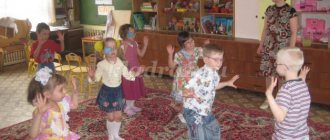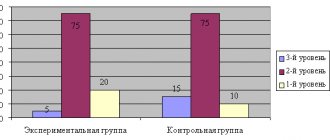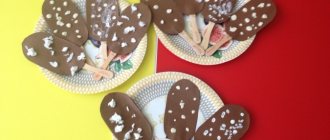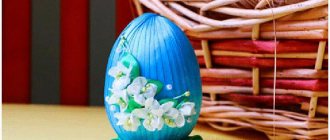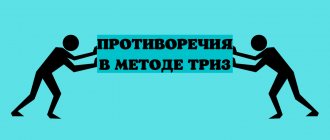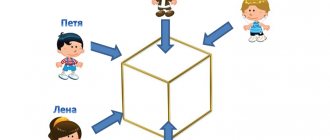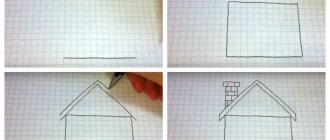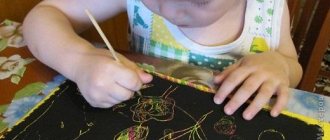Canteen duty
Setting tables for lunch and cleaning them after meals teaches children to quickly and efficiently carry out important tasks. It is advisable that quick and slow children be paired up, so that they will not return too early from a walk or be late for naptime.
The outline plan for routine moments in the senior group may contain the following tasks:
- Teach children to conscientiously perform their duties.
- Cultivate interest and a positive attitude towards joint work.
- Learn to set the table according to the dishes being served.
- Develop memory and logic.
- Improve communication skills, the ability to negotiate, and act together.
- Learn to evaluate the results of work performed.
First, those on duty wash their hands and put on aprons and scarves. The teacher tells them the lunch menu. Children independently distribute responsibilities, set tables, lay tablecloths, and arrange cutlery. Invention is encouraged (for example, the idea of using flowers for decorations, unusual ways of folding napkins). The teacher can suggest rational methods for performing this or that action.
After lunch, the attendants sweep up the crumbs, remove empty dishes, bread bins and napkin holders from the tables, and fold the tablecloth. The teacher must evaluate the children’s actions and express gratitude to them for their help.
Setting goals
Before drawing up a summary of the routine issues in the senior group, the teacher should familiarize themselves with the educational program. It indicates what hygiene skills should be developed at this age.
So, when washing, children should act quickly and independently and dry themselves with a personal towel. The habit of washing hands with soap before eating, after visiting the toilet and when dirty is established.
During lunch, children should eat quietly and carefully. They are taught how to properly handle a fork and knife and use a napkin. When sitting at a table, you need to remember about your posture. Coming out from behind him, the children push up their chair and thank the adults, as well as those on duty.
Children should dress and undress quickly, without the help of adults. Things and shoes are neatly put away in a locker in a certain order. The teacher creates in children the need to monitor the cleanliness of their clothes, pay attention to problems in their appearance, and eliminate them.
At the beginning of the school year, children are monitored. The identified “problem areas” are taken into account when organizing activities at critical times. In the older group, children are already familiar with the sequence of actions; a reminder from an adult is enough for them. Praise and encouragement are also actively used.
Daytime nap
It takes 2 hours. The outline of the organization of a routine moment in the senior group includes preparation for bed: undressing independently, neatly folding clothes on a high chair, visiting the toilet. The teacher's assistant ventilates the bedroom. Before going to bed, you can read a calm fairy tale to the children or sing a lullaby. Sometimes children fall asleep listening to soft music. The teacher makes sure that the kids lie on their sides and keep their hands on top of the blanket.
They wake up the boys gradually. They are asked to perform simple exercises right in bed (stretching, arm movements, rotation of the feet). Then the children get up, do slight bends, and march in place. Older preschoolers must make their own bed. After this, hardening is usually carried out: walking on massage mats, rubbing with soft mittens. Under the guidance of a teacher, children can perform acupressure massage of the face, ears, and hands.
A summary of routine moments in the senior group helps the teacher plan his work. Thanks to him, everyday activities turn into developmental ones, which enhances their educational effect.
Washing
In the sixth year of life, children are taught to independently perform hygiene procedures based on an understanding of their benefits and necessity. A summary of the regime moment “Washing” in the senior group may include the following tasks:
- Formation of the need to wash hands after visiting the toilet, if they are dirty and before eating.
- Consolidating knowledge about various hygiene items (comb, soap, toothbrush, towel, etc.)
- Conveying awareness of the importance of personal hygiene.
- Cultivating a positive attitude towards the washing process.
The teacher uses posters with drawings and short captions, poems, and riddles about hygiene items. He makes sure that the children roll up their sleeves, use soap correctly, do not splash water, turn off the tap, dry themselves with individual towels and hang them up. It is better not to use comparisons with other children. It is more useful to notice the personal progress of each student (“Today you yourself remembered that you need to roll up your sleeves”).
Dressing
Preschoolers are taught to independently monitor their appearance, adjust their collar in a timely manner, tuck their shirt into their trousers, and comb their hair.
In the summary of the regime moment “Dressing” in the senior group, you can indicate the following tasks:
- Cultivate a caring attitude towards your things and neatness.
- Reinforce the correct dressing algorithm.
- Improve skills in fastening buttons, zippers, and tying shoelaces.
- Repeat the name and purpose of clothing, color, the concepts of “left” and “right”.
Before getting ready for a walk, the teacher and the children tidy up the group and put the toys in their places. Each child gets dressed near their locker. It is important that pupils do not throw their clothes around, carefully fold their things, and put away their spare shoes. In winter, you can hang in a visible place the algorithm for dressing and undressing in pictures. If necessary, individual work is carried out with children, practical techniques are demonstrated on dolls.
